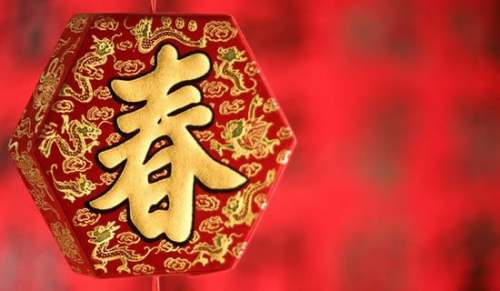关于2022年春节习俗的英语短语
春节将至,都有哪些年味十足的传统习俗?这些习俗你都会用英文说吗?以下是小编整理的作文 春节,希望能够帮助到大家。

贴春联
Paste up/stick spring couplets/scrolls
春联通常是成对张贴,因为双数在中国文化中是好运和吉祥的象征。像所有武功秘籍一样,家家户户过年的基本功——贴春联也有一套口诀:人朝门立,右手为上,左手为下。这句话意思是对联的出句应贴在右手边(即门的左边),对句应贴在左手边(即门的右边)。春联的上下联张贴的.位置不应太高或太低,一般应以门楣的高低为准。
Chinese characters that are auspicious for the coming year are generally written on two pieces of red paper with ink and a brush, and glued by the sides of the doors.
贴福字
Paste up/stick the character of fu
“福”写在红纸上的“福”字表达了中国人内心对幸福的向往。大家印象中“福”字一般都是倒着贴,谐音意为“福到”了。但是福字一定要倒着贴吗?
民俗专家表示,按照规范的民俗讲究,大门上的福字必须是正贴,象征“迎福”和“纳福”之意,而且大门是家庭的出入口,是一种庄重的地方,所贴的福字,须端庄大方,所以要正贴。而室内的地方比如柜子、米缸等等就可以倒贴福字。
The character fu, or “happiness” is usually written on red diamond-shaped posters. They are usually stuck upside down on the doors. This is because the Chinese character dao (upside down) has the same sound as another dao, which means “arrive”. Placing fu upside down symbolizes the arrival of happiness.
放烟花/鞭炮
Set off fireworks/ firecrackers
传说中,烟花爆竹最开始是用来驱赶“年”这头怪兽的。而现在放烟花、点鞭炮主要是为了增加节日气氛,让年味更浓。
Chinese people traditionally set off fireworks during Spring Festival, in the belief that this helps scare off the Nian and brings good fortune at the beginning of the year and good luck throughout the year.
拜年
Pay lunar New Year’s calls/visits; give Spring Festival greetings
传统的拜年手势男女有别。标准的男子作揖姿势是右手成拳,左手包住。因为右手是攻击手,要包住以示善意。女子则相反,但女子不抱拳,只压手。
It’s important that you pay relatives and friends a new year’s call during the holiday. This is done at people’s homes from New Year’s Day to the 15th day, or the Lantern Festival. People give each other best wishes and gifts. This is also a time for the younger generation to bow or kowtow to the elders for health, good fortune, work, and so on and to get a red package in return.
压岁钱/红包
Lucky money/ red envelop
为什么钱要放在红包里呢?因为中国人认为红色代表红红火火、生活幸福。红包也包含了长辈对晚辈的祝福和期待。在香港,不止小孩会拿到红包,只要为你服务的人,都可以给TA一个红包,不过人家把这个叫“利是”。
For many young people, Chinese new year is just as much about yasuiqian — money in red envelopes traditionally given to children. On the Chinese mainland, kids get red envelopes at home from their parents and relatives. In Hong Kong, it is also customary to give Lai See (利是), a gift of money, to anyone in your personal service, such as nannies and cleaners.
过年禁忌
New Year taboos
首先一点就是语言上忌讳。过年的时候像“死”、“失败”、“病”这样比较晦气的话不能说 。
打破碗碟也是忌讳。如果不小心打破了,在场的人必须以迅雷不及掩耳盗铃儿响叮当之势,说上两句吉祥的顺口溜,如“岁(碎)岁平安”,“打发(大发,发财之意)”等来弥补。
Words can reflect New Year taboos. People tend to, for example, avoid negative words, such as “failing”, “dying”, and “illness” during New Year’s celebrations. Breaking a dish is another taboo in some places, because it implies that you will not have a thing to eat.
很多地方过年的时候不能扫地,或者扫地时只能往屋内扫,不能往屋外扫,因为这样会把“财气”扫出去。春节期间也不能扔垃圾,因为同样有可能扔掉“财运”。但是现在,这些禁忌不太适合今天的生活了。
People do not carry the garbage out or clean the house on New Year’s Day or for the rest of the Spring Festival holiday, for fear of sweeping away good luck.
春节期间也忌讳剃头。事实上整个正月都忌讳剃头,因为剃头的话会“死舅舅”。这个习俗据说来源于清朝。满清入关要求所有男子剃掉前额的头发,在脑后扎一条辫子。当时许多人把遵从传统习惯和怀念明朝的情感结合起来,约定每到正月里大家都不剃头,并将这个行动定名为“思旧”,意思是“思念过去的历史”。但随着时间的流逝,口耳相传,以讹传讹,“思旧”的谐音附会成了“死舅”,于是有了流传至今的民俗。
People usually get a haircut before the lunar new years eve because it is said that getting ones hair cut in the first lunar month puts a curse on ones maternal uncles.
春节词汇
买年货do Spring Festival shopping
敬酒propose a toast
烟花 fireworks
压岁钱gift money
扫房spring cleaning
年夜饭the dinner on New Years Eve
庙会tepmle fair
爆竹firecrackers
舞狮lion dance
对联poetic couplet
剪纸 paper-cuts
年画New Year paintings
舞龙dragon dance
戏曲traditional opera
杂耍traditional opera
灯谜riddles written on lanterns
灯会exhibit of lanterns
守岁staying-up
拜年New Years visit
祭祖宗offer sacrifices to ones ancestors
【关于2022年春节习俗的英语短语】相关文章:
关于春节的英语短语10-16
关于盐的英语短语11-25
关于友谊的英语短语11-18
关于帽子的英语短语11-13
关于英语的动词短语11-12
描写春节的十个英语短语11-17
关于医护类的英语短语12-02
关于月亮的有趣英语短语11-26
关于细盐的英语短语11-16
关于评价别人的英语短语11-14